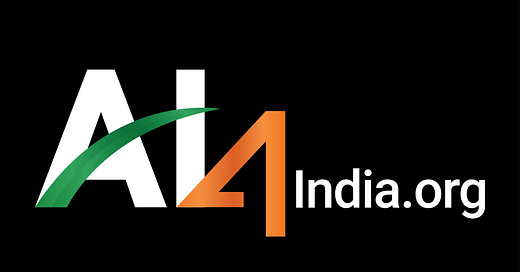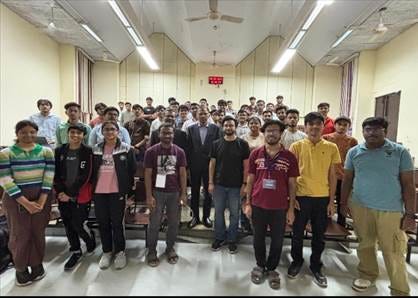India’s AI ecosystem is evolving at an unprecedented pace, driven by a push for homegrown solutions that reflect the nation’s linguistic and cultural diversity. This week, AI4India co-founder Shashi Shekhar Vempati underscores the importance of an indigenous AI stack, while the India AI Mission progresses with 187 proposals for foundation models. We also explore strategies to retain top tech talent, AI’s role in preserving India’s manuscript heritage, and the latest developments in AI for financial analysis and national security. Plus, a closer look at how India’s GCCs are driving global AI innovation and the ethical debate surrounding AI-generated art in the style of Studio Ghibli. Stay ahead with the latest in India’s AI revolution!
Shashi Shekhar Vempati on IND’AI: Building the Ecosystem
India's AI journey is rapidly evolving, with a strong push toward indigenous AI development that caters to the country’s unique linguistic and cultural diversity. At the What India Thinks Today event, AI4India co-founder Shashi Shekhar Vempati emphasized the importance of India developing its own AI stack rather than relying solely on global models. He highlighted that foundational technologies like AI should be treated as strategic assets, much like India's vaccine development efforts during COVID-19. With geopolitical dynamics shifting, having a self-reliant AI ecosystem ensures that India's digital future remains secure and independent.
Vempati also pointed out that international AI models often fail to capture the nuances of India’s vast linguistic and cultural diversity. To bridge this gap, he cited past efforts such as Prasar Bharati’s collaboration with IIT Kanpur to develop AI-driven solutions using Doordarshan and All India Radio archives. While initiatives like the IndiaAI mission have laid the foundation for AI innovation, he called for a broader movement that includes contributions from private-sector data to accelerate indigenous model development. With AI set to power India's digital revolution, building a robust and inclusive AI ecosystem remains a national priority.
India’s AI Mission: 187 Proposals for Indigenous Foundation Models
The Indian government’s push for homegrown AI foundation models has received 187 proposals from researchers, startups, and institutions in response to a call issued on January 30. The initiative, part of the India AI Mission, aims to develop large language models (LLMs) trained on Indian datasets, covering diverse languages and local contexts. MeitY Additional Secretary Abhishek Singh highlighted that computational challenges in AI research are being tackled through investments in semiconductors and chip design, which will help lower model training costs. The government is currently evaluating proposals, with funding decisions expected soon.
The announcement was made at the Nano Electronics Roadshow and Conference on Semiconductor Ecosystem, where ISRO Chairman V Narayanan emphasized the need for greater self-reliance in electronic components for AI and space applications. With India’s semiconductor sector projected to reach $100-110 billion by 2030, the country is making strategic moves to strengthen its AI and electronics ecosystem. The India AI Mission continues to drive innovation, laying the foundation for future breakthroughs in AI and technology.
Spool Back Tech Talent: Unlocking India’s AI & Deep-Tech Potential
India’s startup ecosystem, coupled with its vast tech talent pool, presents an unprecedented opportunity to lead in AI, quantum computing, and semiconductors. However, to realize this potential, the country must focus on converting intellectual property into commercially viable products. Despite ranking 6th globally in patent filings, India's IP commercialization lags, with innovation struggling to translate into market-ready solutions. Strategic investments—including the ₹1 lakh crore R&D fund, ₹10,300 crore for the IndiaAI Mission, and dedicated deep-tech funding—are steps in the right direction. Yet, attracting and retaining top-tier talent remains the key challenge.
A robust talent pipeline is critical to sustaining India’s innovation momentum. Drawing inspiration from global models, India must create structured programs to attract distinguished researchers, scientists, and tech entrepreneurs. Amitabh Kant proposes two structured tracks: one for 250 elite academics from top universities, offering long-term research commitments in India, and another for 1,000 research sabbaticals with significant funding. Such initiatives, coupled with industry collaborations and institutional support, can transform India into an IP powerhouse. If executed successfully, these programs could establish India as a global AI and deep-tech hub, ensuring that innovation thrives within the country rather than flowing abroad.
AI to Unlock India’s Manuscript Heritage: Parliamentary Panel’s Recommendations
A parliamentary panel has recommended the creation of an AI-powered platform to convert manuscript images into searchable text with provisional translations across major Indian languages. The Standing Committee on Transport, Tourism, and Culture, in its report on the Ministry of Culture’s 2025-26 budget, emphasized the need for an advanced knowledge extraction framework to preserve and enhance access to India’s rich manuscript heritage. As part of this initiative, the report suggests the development of ‘Pandulipipatala 2.0,’ an advanced digital ecosystem incorporating AI-enhanced search capabilities, semantic linking across repositories, and scholarly annotation tools. To ensure the long-term preservation of these invaluable texts, blockchain technology is proposed for provenance documentation, preventing illicit trafficking and enabling secure digital certification of manuscripts.
The panel also envisions a nationwide training program for ‘Pandulipi Mitras’—grassroots personnel equipped with skills for documentation, preservation, and digitization of manuscripts. It calls for the establishment of Conservation Research Laboratories specializing in different manuscript materials, such as palm leaf and birch bark, to develop non-invasive preservation techniques. Furthermore, a ‘Manuscript Knowledge Portal’ is proposed to contextualize digitized content with historical insights, while a ‘Digital Humanities Incubator’ would foster interdisciplinary research. By integrating AI with cultural preservation, these recommendations seek to transform static archives into dynamic knowledge resources, ensuring wider accessibility and engagement with India’s manuscript heritage.
Read More
NFRA and IIT Kanpur Host Hackathon on LLM and Generative AI for Financial Analysis
The National Financial Reporting Authority (NFRA) and IIT Kanpur jointly organized a hackathon focused on Large Language Models (LLM) and Generative AI, bringing together students from across India to develop solutions that simplify financial statement analysis. Held on March 28-29, 2025, the event challenged participants to transform complex financial data into clear, engaging narratives, making financial reporting more accessible and insightful. Teams explored how GenAI could automate data extraction, generate financial summaries, and enhance comprehension, paving the way for more informed decision-making.
The hackathon saw winning teams from VIT Vellore, MNNIT Allahabad, IIT Lucknow, and Rajiv Gandhi University of Knowledge Technologies, Nuzvid, recognized for their innovative solutions. Judged by experts from IIT Kanpur and NFRA, the event underscored the role of AI in financial regulation. Notably, several teams opted to open-source their innovations, fostering further development and collaboration. NFRA aims to continue engaging with the student community, promoting AI-driven advancements in financial reporting.
India's GCCs Spearheading AI Innovations for Global Operations
Global Capability Centres (GCCs) in India are emerging as the nerve center for AI-driven innovation across industries. From travel and automotive to retail, these hubs are not just supporting but actively leading strategic AI initiatives for multinational companies. Amadeus, a travel technology giant, exemplifies this trend with its India technology hub developing AI solutions that personalize travel experiences. By analyzing vast datasets, Indian engineers power AI-driven landing pages tailored to individual travelers, revolutionizing customer engagement. Similarly, Continental's India Technical Centre plays a pivotal role in developing radar and generative AI technologies for autonomous mobility, underscoring India's growing influence in global AI-led transformations.
Beyond industry-specific innovations, India’s GCCs are evolving into Global Value Centres (GVCs), as highlighted by IBM Consulting. The focus has shifted from cost efficiency to core product development, end-to-end digital transformation, and AI-driven revenue generation. Companies like Lowe’s leverage their India teams to refine AI-powered customer assistance and predictive analytics for retail efficiency. With a robust foundation in AI governance, these centres are ensuring security, fairness, and transparency in AI deployments. As organizations increasingly rely on their Indian hubs for strategic leadership, India’s role in the global AI ecosystem is becoming indispensable.
AI Buzz of the Week: The Ghibli AI Controversy - Art, Ethics, and Ownership
Studio Ghibli, founded by Hayao Miyazaki, Isao Takahata, and Toshio Suzuki, is renowned for its masterful hand-drawn animation and distinct artistic style. Unlike many modern productions that rely on CGI, Ghibli remains committed to traditional techniques, making its films globally revered. However, recent advancements in AI, particularly ChatGPT’s ability to generate Ghibli-style images, have sparked debate. While some see this as a tribute that brings more attention to Ghibli’s art, others criticize it as unauthorized replication, raising concerns about artistic integrity and creative ownership.
This controversy highlights a broader issue in AI-driven content creation: the lack of proper recognition and compensation for original artists. AI models continuously learn from existing works, often without explicit approval, leading to ethical and legal dilemmas regarding copyright and intellectual property. As AI-generated content becomes more sophisticated, it raises urgent questions about authenticity, artistic rights, and the need for stronger regulations to ensure fair treatment of creators. At its core, the debate underscores a fundamental belief—AI should not replicate copyrighted artistic styles without the clear consent of the original creators.
#DataDaan - Donate for a Digital India
Aligned with the IndiaAI Mission and MeitY’s efforts to ensure the availability of AI-usable data, the #DataDaan campaign by AI4India is now live on DataDaan.org. This initiative invites individuals and organizations to contribute valuable datasets, enriching India’s AI ecosystem and driving innovation across sectors. The platform provides a streamlined process for data contribution, ensuring responsible and impactful AI development. Visit DataDaan.org to explore the initiative and be part of this transformative effort.
NOTE: The views expressed by the authors are their own. AI4India as a forum does not endorse any comments on specific brands, products, platforms or companies.
Join our AI4India.org forum to be a part of the AI revolution in India by visiting our site now.
Follow us on our X and LinkedIn to receive interesting updates and analysis of AI-related news








